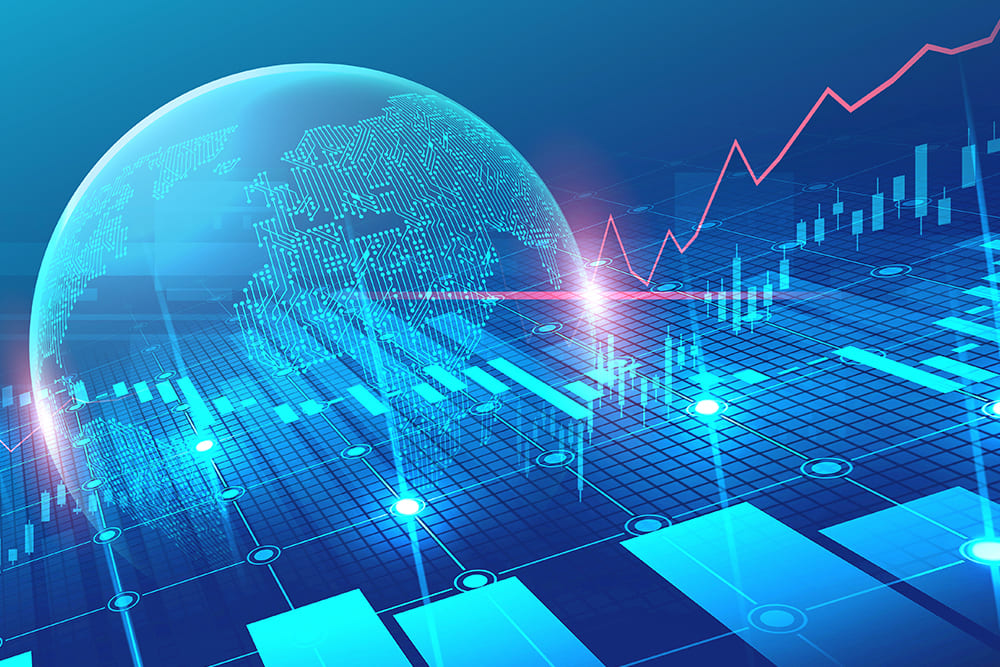The 5 Biggest Global Trends Every Business Must Be Ready For
22 November 2021
No business operates in a vacuum. Today’s organizations are continually shaped by the world around them, and the same will be true for the organizations of the future. It makes sense, then, that business leaders must pay attention to emerging trends in politics, economics and society if they want to build a robust, sustainable organization.
In this article, I explore the five biggest global trends – and how businesses must prepare for them.

Trend 1: Our relationship with our planet
You only need to look at the abnormal weather patterns and natural disasters we’re experiencing to know that our planet is under immense strain. Couple that with a growing world population, and you have a tinder box of uncertainties around crop production, food security, and migration, to name just a few. By the end of this century, as many as 150–200 million people could be forced to migrate from land that will be underwater. And to keep pace with the growing global population, estimates suggest we’ll have to increase food production by between 26 percent and 68 percent by 2050. That’s a big increase for an already struggling planet to accommodate.
I consider the emerging climate disaster to be the biggest challenge humanity has ever faced. And this concern is widespread; according to Ipsos, globally, 73 percent of people agree we’re on course for a climate disaster.
So what has this got to do with your business? With a global majority agreeing that the world is facing a huge crisis, we can expect consumers to gravitate towards more sustainable options. And this means your organization must do everything it can to maximize its green credentials.
Trend 2: Shifts in economic and political power
Solving the climate crisis requires countries to work together. So the fact that global economic and political power structures are undergoing huge changes makes this job all the more difficult.
What do I mean by changing power structures? In a nutshell, by 2050, the list of the most economically and politically powerful countries in the world will look very different to today.
China’s economy, for example, is now predicted to overtake the United States by 2028, five years earlier than previously thought. And the combined economic power of the E7 economies – China, India, Brazil, Mexico, Russia, Indonesia, and Turkey – could be double that of the G7 by 2040.
The takeaway here? As economic power shifts, it will become more expensive for organizations to outsource services to countries such as India. This is something businesses will have to plan for. On the plus side, these economies could become strong markets for products and services.
Trend 3: Growing divergence and polarization
There have been some notable examples of political fragmentation and growing divergence in recent years. Brexit. President Trump withdrawing the US from the Paris Agreement on climate mitigation. Russia announcing it has the ability to completely unplug from the rest of the world’s internet and operate its own independent internet… In short, after decades of countries growing closer together, there are signs that they are beginning to "consciously uncouple."
When information and analytics company IHS Markit set out its prediction of how the world would look in 2025, it said the “fragmented world” scenario – in which the US, China, the EU, and other key global players retreat from globalization and turn their gaze inwards – is the most likely. COVID-19 is likely to exacerbate this further as countries are forced to focus on domestic problems.
This growing divergence may mean companies find themselves locked out of certain markets, which means relying on any one overseas market in our increasingly changing world is a high-risk strategy.
Trend 4: Shifting demographics
The global population in 2050, or even 2030, will look very different from how it looks today. That’s because the population is growing (globally, that is – some countries are experiencing population decline). What’s more, populations are getting older, the middle class is growing, and people are increasingly living in urban areas. As an example, the number of megacities (classified by the UN as cities with 10 million or more inhabitants) is also on the rise; by 2030, there will be 43 megacities, up from 33 in 2018.
Clearly, the business opportunities around the growing urban populations and consuming classes are huge. But participating in these markets successfully will require businesses to adapt to different cultural and political environments.
Trend 5: Social, cultural and workplace shifts
The workplace demographic is also shifting significantly. The number of Gen Z-ers and millennials in the workplace is on the rise, and baby boomers are retiring. And with this changing workforce come changing expectations and priorities; as an example, 65 percent of people want to work for an organization “with a powerful social conscience.”
How we work is changing, too. One in five global employees now work remotely at least some of the time, and the coronavirus pandemic will only accelerate this “work from anywhere” culture. Organizational structures will become more fluid, and more people will expect to "float" between teams, roles, and employers. The days of the "job for life" are well and truly gone, and more people will work in the gig economy, as freelancers, and as free agents.
All employers must therefore assess their working practices to see whether they are offering this changing workforce the working environment they want (and expect) – one where people have greater flexibility, a better work-life balance, and a meaningful connection with the brands they work for.
These five global trends represent very real opportunities – and risks – for businesses. Read more about these and other future trends in my new book, Business Trends in Practice: The 25+ Trends That are Redefining Organizations. Packed with real-world examples, it cuts through the hype to present the key trends that will shape the businesses of the future.
Related Articles
Can Your Device Run Apple Intelligence? What You Need To Know
Apple's announcement of Apple Intelligence has sent waves of excitement through the tech world.[...]
10 Amazing Things You Can Do With Apple Intelligence On Your IPhone
Apple Intelligence is poised to revolutionize the iPhone experience, offering a suite of AI-powered tools that promise to make your digital life easier, more productive, and more creative.[...]
Agentic AI: The Next Big Breakthrough That’s Transforming Business And Technology
The world of artificial intelligence is evolving at a breakneck pace, and just when you thought you'd wrapped your head around generative AI, along comes another game-changing concept: agentic AI.[...]
The Employees Secretly Using AI At Work
Imagine walking into your office and noticing your colleague Sarah effortlessly breezing through her tasks with uncanny efficiency.[...]
Battling AI Fakes: Are Social Platforms Doing Enough?
Since generative AI went mainstream, the amount of fake content and misinformation spread via social media has increased exponentially.[...]
Creating The Universal AI Employee Of The Future
Imagine a world where your most productive employee never sleeps, never takes a vacation, and can seamlessly adapt to any role you need.[...]
Sign up to Stay in Touch!
Bernard Marr is a world-renowned futurist, influencer and thought leader in the fields of business and technology, with a passion for using technology for the good of humanity.
He is a best-selling author of over 20 books, writes a regular column for Forbes and advises and coaches many of the world’s best-known organisations.
He has a combined following of 4 million people across his social media channels and newsletters and was ranked by LinkedIn as one of the top 5 business influencers in the world.
Bernard’s latest book is ‘Generative AI in Practice’.










Social Media